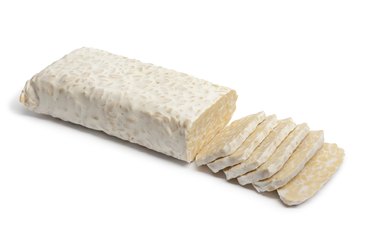
Tempeh is a highly nutritious soybean product popular in Indonesia and many places in Asia. Unlike tofu, tempeh is fermented, which allows easier digestion of its protein and reduces the harmful affect of its phytic acid. Like all soy products, tempeh contains plant hormones known as phytoestrogens, specifically called isoflavones. Isoflavones are able to mimic some effects of estrogen in your body. As such, eating tempeh may be beneficial for symptoms of menopause, but women who have been diagnosed with estrogen-receptor positive breast cancer should be cautious with their soy intake. Consult with your doctor about the pros and cons of adding tempeh to your diet.
Tempeh
Video of the Day
Tempeh is made by cooking and dehulling soybeans, then inoculating them with a culturing agent and incubating the product overnight until it forms a solid cake. Tempeh has a distinctive nutty taste and nougat-like texture, and is becoming increasingly popular in North America. Tempeh is an excellent source of protein, which is made more digestible because the fermentation process converts some of the protein into amino acids, saving your digestive system from the task. The fermentation process also neutralizes the phytate within the soybeans. Phytic acid limits your body's absorption of minerals.
Video of the Day
Phytoestrogens
All soy foods are rich in isoflavones, which are phytoestrogens. The most powerful isoflavone in tempeh is genistein, which is structurally similar to human estrogen but a weaker form. Genistein is tissue specific, meaning it works differently in different parts of your body. The effects of genstein also depend on other factors, such as estrogen receptor numbers and the amount of competing human estrogen in your bloodstream. However, genistein is weaker than natural estrogen and is thought to only block human estrogen from its receptor sites and not exert a strong estrogenic effect itself, according to the "American Cancer Society Complete Guide to Nutrition for Cancer Survivors."
Estrogen and Breast Cancer
It has been well established that elevated levels of estrogen triggers breast cell reproduction, which at high levels can encourage, accelerate or possibly even cause breast cancer. However, the research attempting to clarify the role that phytoestrogens play in the development of breast cancer is mixed and often conflicting. For example, there are studies that report that genistein stimulates growth of estrogen-receptor positive breast cancer cells under laboratory conditions, just like human estrogen does. On the other hand, a study was published in a 2009 edition of "Breast Cancer Research and Treatment" and concluded that American women given isoflavones showed reduced risks of breast cancer recurrence, especially if they were given the drug tamoxifen. This finding prompted the National Cancer Institute to state that isoflavones display mild estrogen-like activities which may regulate hormone balance and reduce the risks of breast cancer.
Recommendations
Tempeh is a tasty and nutritious food that offers many health benefits, but its ability to mimic estrogen may be of concern to some women. If you are post-menopausal and never had breast cancer, than the genistein in tempeh may help reduce your menopausal symptoms without much risk. If you are premenopausal with a personal history of estrogen-receptor positive breast cancer or if it strongly runs in your family, then you should be cautious with your soy intake. Research on the effects of phytoestrogens on human cancers has been merely observational and future studies need to look closer at biochemistry and cellular biology to better understand the true benefits or hazards. Consult with your doctor if you are unsure about how soy products such as tempeh may impact your health.
Is this an emergency? If you are experiencing serious medical symptoms, please see the National Library of Medicine’s list of signs you need emergency medical attention or call 911.